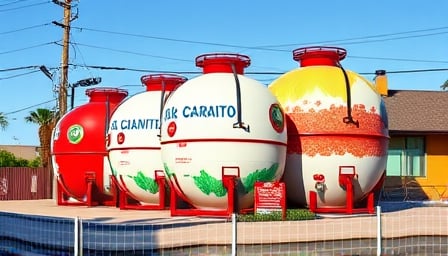Corporate News Report
Air Liquide’s Strategic Expansion and Market Outlook
Air Liquide, a global leader in industrial gases and chemical solutions, has recently reinforced its position in two pivotal sectors: the semiconductor manufacturing industry and the emerging hydrogen economy. The company’s latest investment of €130 million in new Air Separation Units (ASUs) for the Singapore chip sector exemplifies its commitment to providing critical feedstock for advanced electronics manufacturing. At the same time, the broader hydrogen generation market, projected to grow rapidly due to breakthroughs in electrolysis, carbon capture integration, and large‑scale infrastructure deployment, offers significant new avenues for the firm’s long‑term diversification.
1. Investment in the Singapore Semiconductor Ecosystem
Singapore has positioned itself as a regional hub for semiconductor fabrication, with an array of advanced fabs and a highly skilled workforce. Air Liquide’s €130 million allocation to ASUs in the country addresses two key needs:
| Driver | Impact on Air Liquide |
|---|---|
| Demand for high‑purity gases | Enables Air Liquide to supply ultra‑clean nitrogen, oxygen, and argon critical to photolithography and wafer processing. |
| Supply chain resilience | Reduces reliance on imported gases, mitigating disruptions seen during global supply chain strains. |
| Vertical integration | Positions the company as a strategic partner for semiconductor fabs, potentially unlocking long‑term service contracts. |
The investment is expected to drive incremental revenue and strengthen the firm’s foothold in the electronics sector, where margins are high and the demand for specialized gases is inelastic.
2. The Expanding Hydrogen Generation Market
The hydrogen economy is projected to expand at a compound annual growth rate of ~10% over the next decade, fueled by:
- Electrolysis technology advancements – Lowering capital and operating costs for water splitting.
- Carbon capture and utilization (CCU) – Enabling blue hydrogen production with near‑zero emissions.
- Infrastructure scaling – Development of hydrogen refueling stations and bulk transport networks.
Air Liquide’s existing expertise in gas handling, purification, and safety systems positions it favorably to capture a substantial share of this market. The company’s hydrogen portfolio already includes electrolyzers, storage solutions, and distribution pipelines, allowing for a seamless transition into broader hydrogen services.
3. Financial Health and Market Perception
| Metric | Value |
|---|---|
| Market capitalization | €101 billion+ |
| Price‑to‑Earnings (P/E) | ~30 |
| 52‑week high | €187.12 |
| 52‑week low | €153.42 |
Air Liquide’s valuation reflects its robust earnings profile and steady cash flow generation. A high P/E ratio is consistent with growth expectations in high‑margin sectors such as electronics gases and hydrogen infrastructure. The stock’s relative stability suggests disciplined capital allocation and a focus on long‑term value creation.
4. Analyst Sentiments
Analysts remain divided on Air Liquide’s equity:
- Bullish View: Some recommend a “buy” rating with a target price of approximately €200, implying a potential upside of over 20% from current levels. This perspective cites the company’s expanding presence in high‑growth sectors and the expected acceleration of hydrogen deployment.
- Neutral Stance: A contrasting analyst downgraded the stock to “neutral,” arguing that the high valuation, coupled with uncertain macro‑economic conditions, could temper growth expectations.
The divergence underscores the importance of monitoring both the pace of sectoral adoption (semiconductor and hydrogen) and broader economic factors such as commodity price volatility and fiscal policy shifts.
5. Strategic Implications
Air Liquide’s dual focus on high‑tech gas supply for the semiconductor industry and the nascent hydrogen economy illustrates a broader corporate strategy: leveraging core competencies to capture growth in adjacent, high‑barrier markets. By deepening its involvement in Singapore’s chip ecosystem, the company taps a sector with persistent demand and limited substitute providers. Simultaneously, its hydrogen initiatives align with global decarbonization goals, positioning Air Liquide as an early mover in a potentially transformative energy transition.
6. Conclusion
Air Liquide’s recent €130 million investment in Singapore’s semiconductor infrastructure and its proactive engagement with the expanding hydrogen market signal a clear intent to diversify and reinforce its market leadership. The firm’s strong financial base, coupled with a forward‑looking product portfolio, provides a compelling narrative for investors seeking exposure to both high‑margin industrial gases and emerging clean‑energy technologies. Analysts’ mixed recommendations reflect the inherent uncertainties of rapid technological change and macro‑economic dynamics, but the company’s strategic positioning offers a resilient foundation for sustained growth.
